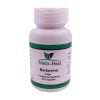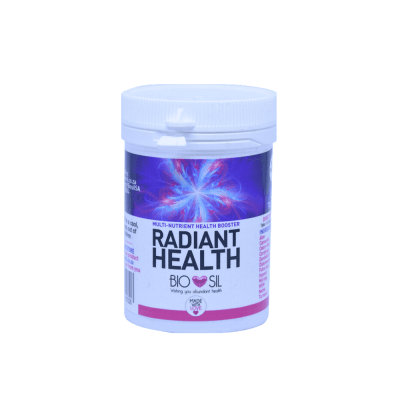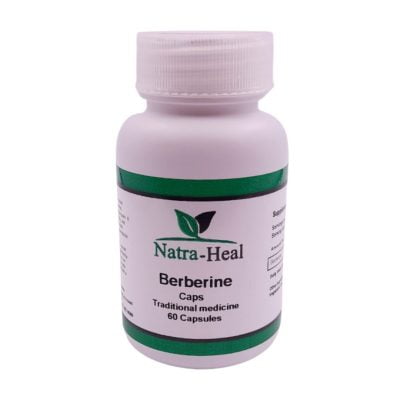Berberine vegan capsules
Contents:
60 vegan capsules
Berberis Vulgaris – 560mg
Pure, additive-free, not irradiated, organic
Berberine was first utilized thousands of years ago in Traditional Chinese Medicine and Ayurvedic medicine.
What is berberine used for today?
It’s been shown in studies to have many pharmacological effects, including antimicrobial, antitumor, anti-inflammatory and blood glucose-lowering capabilities.
Extracts and supplements made from this compound, such as berberine HCL, are generally inexpensive, safe and well-known for their broad antibacterial activities. They may even be able to help naturally treat conditions without the use of antibiotics

What Is Berberine?
Berberine (also known as berberine hydrochloride) is a natural isoquinoline alkaloid found in a wide variety of herbs, including goldenseal, barberry, goldthread, Oregon grape and tree turmeric.
Within these plants, the berberine alkaloid can be found in the stem, bark, roots and rhizomes (rootlike subterranean stems) of the plants. It has a deep yellow color — so much so that it has been used as a natural dye.
Berberine is found in a group of shrub plants called Berberis. It is also the main active component of two herbs that are popular in natural medicine: Coptidis Rhizoma and Phellodendri Chinensis Cortex.
In Traditional Chinese Medicine, these herbs have been used to naturally treat diabetes for centuries. This compound also has a long history of use for managing bacterial gastroenteritis, diarrhea and other digestive diseases.
Alkaloids are defined as a class of organic compounds of plant origin containing mostly basic nitrogen atoms. Consuming them can have pronounced physiological actions on humans, especially pertaining to cardiovascular and metabolic health.
A growing number of studies have uncovered evidence that berberine benefits can include protecting against:
- Metabolic syndrome
- Diabetes
- Gastrointestinal infections
- Heart disease
- High cholesterol
- Hypertension (high blood pressure)
- Immune challenges
- Joint problems
- Low bone density
- Weight control
- Possibly depression and cognitive decline
- Potentially formation of cancer cells
Why is this? It’s due to the molecule structures berberine possesses
Further information:
Grateful thanks to Dr Axe for this in depth information:
Original link is here : https://draxe.com/nutrition/berberine/ https://draxe.com/nutrition/berberine/
Health Benefits
1. Potential Diabetes Treatment
In one study, berberine was found to help lower blood glucose. This can help prevent and treat type II diabetes and its complications, including diabetic cardiovascular disease and diabetic neuropathy.
It’s also been shown to have positive effects on glucose-lipid metabolism, inflammatory factors and insulin resistance in patients with metabolic syndrome.
One of the most impressive studies compared taking 500 milligrams of the compound two to three times daily for three months to taking the common diabetes drug metformin. Berberine was able to control blood sugar and lipid metabolism as effectively as metformin, with researchers describing it as a “potent oral hypoglycemic agent.”
Additional studies have also indicated that berberine improves glucose uptake and lipid metabolism disorders. For example, a study published in Evidence-Based Complementary and Alternative Medicine demonstrated that berberine can improve insulin sensitivity by adjusting adipokine secretion.
Thanks to its effects on insulin sensitivity, this compound may also help prevent kidney damage, according to some studies.
2. May Help Lower High Cholesterol and High Blood Pressure
There’s evidence that berberine may help lower high LDL, total cholesterol and high blood pressure levels.
A study published in the journal Metabolism showed that berberine reduced serum cholesterol along with triglyceride levels in type 2 diabetic patients. It seems to work by inhibiting PCSK9, which, as research from Harvard Medical School notes, helps lower cholesterol.
A separate study found that the combined administration of red yeast rice — well-known for its ability to naturally lower cholesterol — and berberine may provide a broader range of cholesterol protection with a lower risk of serious adverse effects compared to prescription statin therapy.
In animal studies, berberine has been shown to decrease abnormally high concentrations of fats and lipids in the blood by promoting the excretion of cholesterol from the liver and inhibiting the intestinal absorption of cholesterol.
Because it can lower blood sugar, improve LDL cholesterol and triglyceride levels, reduce testosterone levels, and lower waist-to-hip ratio, it offers benefits for women with polycystic ovary syndrome (PCOS) as well.
It can also improves blood pressure levels and circulation among people with metabolic syndrome when consumed with a healthy diet high in antioxidants or supplements such as folic acid, coenzyme Q10 and astaxanthin.
3. May Help Support Weight Loss
Berberine is one of few compounds that is capable of activating adenosine monophosphate-activated protein kinase (or AMPK). AMPK is an enzyme inside the human body’s cells, which is often called a “metabolic master switch” since it plays a crucial role in regulating metabolism.
AMPK activation boosts fat burning in the mitochondria, which is why studies have demonstrated that berberine may help stop fat accumulation in the human body and protect against metabolic syndrome.
In one study published in Phytomedicine, obese adults were given 500 milligrams of berberine orally three times per day for a total of 12 weeks. The efficacy and safety of the treatment was determined by measurements of body weight, comprehensive metabolic panel, blood lipid and hormone levels, expression levels of inflammatory factors, complete blood count and electrocardiograph.
Overall, this study displayed that berberine is a potent lipid-lowering compound with a moderate weight loss effect.
4. Potential Protection Against Cognitive Decline
Studies have evaluated the therapeutic potential of berberine against neurodegenerative diseases like Alzheimer’s disease, Parkinson’s disease and trauma-induced neurodegeneration. While more research is warranted, one study revealed that there are multiple positive effects of berberine — some of which enhance neuroprotective factors/pathways and others that counteract neurodegeneration.
Animal studies have also shown that it may help fight depression. There’s evidence that berberine possesses protective central nervous system activities, particularly the ability to inhibit monoamine oxidase-A, an enzyme involved in the degradation of norepinephrine and serotonin, that has mood-lifting effects.
5. Can Help Manage SIBO
Patients who suffer from small intestine bacterial overgrowth (SIBO) symptoms have excessive bacteria in their small intestines. Present conventional treatment of SIBO is limited to oral antibiotics with inconsistent success.
The objective of one study published in Global Advances in Health and Medicine was to determine the remission rate of SIBO using an antibiotic versus an herbal remedy. It found that the herbal treatment, which included berberine, worked just as well as antibiotic treatment and was equally safe.
6. Supports Heart Health
Part of berberine’s positive effect on heart health likely stems from the compound’s ability to help keep blood sugar levels and obesity in check, both of which can raise the risk of coronary heart disease.
It also stimulates the release of nitric oxide, a signaling molecule that relaxes the arteries, increases blood flow, lowers blood pressure and protects against arteriosclerosis.
In research published in the World Journal of Cardiology, people who took berberine had better heart function and were better able to exercise than those who took a placebo.
The cardiovascular effects of berberine also suggest its possible clinical usefulness in the treatment of arrhythmias and heart failure.
7. May Improve Lung Health
Research suggests that berberine benefits lung function due to its anti-inflammatory effects. This alkaloid has even been shown to reduce the effect of cigarette smoke-induced acute lung inflammation.
In one study published in the journal Inflammation, mice were exposed to cigarette smoke to cause acute lung injury and were then given 50 mg/kg of berberine intragastrically. Upon examination of lung tissues, it was found that cigarette smoke caused inflammation of the lung’s alveoli along with cellular edema or abnormal fluid retention.
However, pretreatment with berberine significantly lessened lung inflammation and ameliorated cigarette smoke-induced acute lung injury through its anti-inflammatory activity.
8. May Protect the Liver
Is berberine good for the liver? Although more research is needed to confirm it can defend against liver diseases, early research suggests that berberine supports the liver by decreasing blood sugar, insulin resistance and triglycerides, which are markers of liver damage in people with diabetes and viruses like hepatitis.
It may also offer support for people with fatty liver disease. Studies have found that berberine exerts anti-hyperglycemic and anti-dyslipidemic effects, meaning it improves glucolipid metabolism, which can help address root causes of fatty liver disease.
9. Potentially Has Anti-Cancer Effects
There is increasing research on the regulation of cancer cell metabolism by berberine hydrochloride. That’s because berberine may help induce cancer cell death.
Its anticancer activity, specifically inhibiting growth and proliferation of cancer cells, makes it likely to become a natural component of the nanoparticulate delivery systems used for cancer berberine therapy. For example, berberine induced apoptosis of human tongue cancer cells in research conducted at China Medical University
How to Use Berberine (Plus Dosage)
Berberine can be found in supplement form, most commonly as berberine HCL, online or in most health food stores.
Be careful not to confuse berberine with piperine (black pepper extract), berberrubine (a metabolite) or berberol (a brand name mixture of tree turmeric and milk thistle).
Since berberine has a short half-life, you generally need to take this supplement in divided doses (such as three times a day) to keep stable levels in your blood.
Many studies use dosages of 900 to 1,500 milligrams per day. It’s most commonly recommended to take 500 milligrams three times per day for a total of 1,500 milligrams per day.
It should be taken with a meal, or shortly after, to take advantage of the blood glucose and lipid spike that comes with eating a meal. High doses taken acutely may cause stomach upset, cramping and/or diarrhea, which is another good reason to take berberine in multiple doses throughout the day.
You can work with a natural health care practitioner to determine the dose that works best for you.
Some people also apply berberine directly to the skin to treat burns and to the eye to treat bacterial infections, like trachoma, that frequently causes blindness. It has been shown to be effective against a wide range of bacteria, protozoa and fungi that can affect the skin.
Possible Risks, Side Effects and Interactions
What are side effects of berberine? If you have a medical condition or are on any medications, including antibiotics, then it is recommended that you speak to your doctor before taking it.
This is especially important if you currently take blood sugar-lowering medications.
Since it can lower blood sugar, diabetics who are controlling their blood sugar with insulin or other medications must use caution when using this supplement to avoid dangerously low blood sugar levels. People with low blood pressure should also be careful when using it since it can naturally lower blood pressure.
Pregnant and nursing women should not take berberine.
Is berberine safe to take long term? It’s best to speak with a doctor if you plan to supplement with it for more than 12 weeks.
Overall, this alkaloid has an outstanding safety profile. The main side effects are related to digestion and are minor, as there are some reports of cramping, diarrhea, flatulence, constipation and stomach pain.
Again, by sticking with recommended smaller dosages — spread out through your day and after meals — these possible minor negative berberine side effects can be avoided all together.
Conclusion
- Popular in traditional Chinese and Ayurvedic medicine treatments, berberine is a natural alkaloid found in a wide variety of herbs.
- It’s proven to possess antibacterial, antimicrobial, antitumor, anti-inflammatory and blood glucose-lowering effects.
- Berberine benefits include potentially treating diabetes, lowering high cholesterol, combating obesity, protecting against neurological diseases, treating SIBO, supporting heart health and boosting lung health.
- It also shows potential for cancer inhibition, digestive issues, osteoporosis, burns, bacterial infections and even depression, though further research is needed.
- Berberine side effects are rare when moderate doses are taken, but it can lower blood sugar and blood pressure, so those who take medications must use caution when using this supplement..
.





Reviews
There are no reviews yet.